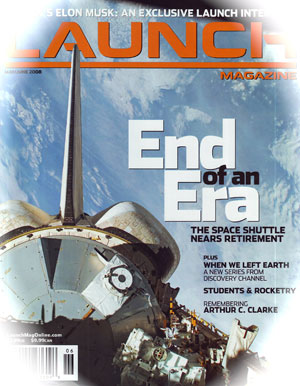Launch failureby Dwayne Day
|
| My naïve hope is that this is a blip, not a trend. |
Actually, it’s not just the protons and neutrons that cost money, it’s also the neurons. People to write articles, take pictures, and provide content all cost cash. LAUNCH announced earlier this year that they were going to put the May issue online for subscribers to access. That never happened, even though the electrons were cheap—clearly LAUNCH’s publishers never found the money to pay for that issue to be written, illustrated, and edited. Not many people can afford to write or take pictures for free, and often readers get what they pay for. We’re transitioning to a phase where media outlets don’t want to pay people to write space journalism. It’s worth asking if we are yet seeing the decline in quality as generalists take over writing stories that used to be written by specialists.
My naïve hope is that this is a blip, not a trend. I’m still heartened to find Spaceflight magazine on the shelves at my local Barnes & Noble, even if it doesn’t appear as if anybody actually buys the three copies that they stock. And I was very pleased to see a copy in a bookstore on Maui; way out there on the other side of the world from Spaceflight’s home town of London, in the middle of the ocean, a lone copy awaited a buyer. But Spaceflight’s parent organization, the British Interplanetary Society, ran into financial problems earlier this year, forcing the Society to consider leasing or selling their London headquarters building. In June, the Society made an appeal for donations, “no matter how small.” The BIS is more than Spaceflight magazine, of course, but for many people, their Spaceflight subscription is their only real tie to the Society. If Spaceflight goes under, I’ll be seriously bummed.
| Hopefully more will recognize that when the community of space publications shrinks, nobody benefits. |
Of course, we still have this glorious thing called the Internet. But even though it’s getting more portable and, unlike your computer, you can take your Kindle to the beach, the net still has its problems. Lack of permanence is one of them. Although there are powerful search engines to find you information, loads and loads of information on the net is temporary. Try to find any of the vast library of articles or images that appeared on Florida Today’s long-vanished (circa 1996–2000) Space Online site. I dare you. You cannot. And yet there was a time when Space Online was the primary Internet source for current space news, before the Lou Dobbs-led Space.com bought it from Gannett for the sole purpose of eliminating the competition. The archives were included as part of the deal, and they’re all gone; no search engine will find them.
Somewhere, presumably, there is a complete set of LAUNCH’s brief publication run on a library shelf, so that in the future energetic researchers can find them. LAUNCH occasionally ran articles that nobody else had, and they may still have value to future readers.
Although few people will probably lament LAUNCH Magazine’s demise, hopefully more will recognize that when the community of space publications shrinks, nobody benefits.
